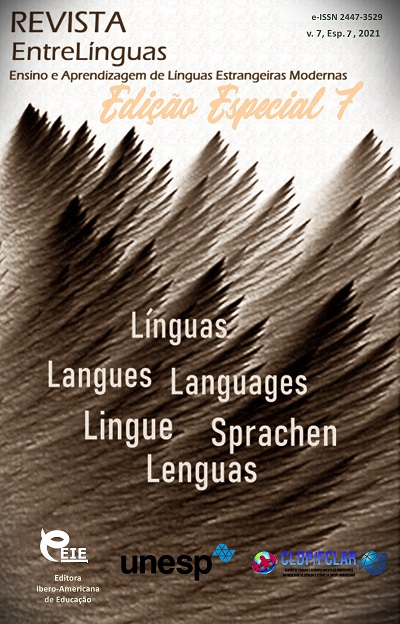Psicologia dos jogos e sua importância na aprendizagem do inglês: aprendendo palavras em inglês na forma de jogos
DOI:
https://doi.org/10.29051/el.v7iesp.7.16336Palavras-chave:
Ensino de línguas, Compreensão, Livro didático, Avaliação de vocabulárioResumo
O objetivo final do ensino de línguas é a compreensão. A condição básica para a compreensão de textos em qualquer idioma é saber uma infinidade de palavras juntamente com seus significados e a capacidade de usá-los. Infelizmente, o tempo insuficiente dedicado às aulas de línguas no ensino médio e em contraste com o grande número de novas palavras que são abordadas em cada uma das aulas dos livros didáticos do ensino médio, fez com que os alunos enfrentassem várias dificuldades em compreender palavras e a incapacidade de usar palavras em situações diferentes. Conhecer esta questão e buscar um método mais eficiente do que o método desatualizado de preservar palavras fora do contexto da frase e também a fim de encontrar um método novo e atraente para ensinar um grande volume de palavras e fixá-las na mente dos alunos , nesta pesquisa, optou-se pelo método de ensino e avaliação de vocabulário por meio de diversão e entretenimento.
Downloads
Referências
Alekseenko, Andrey (2019). Regulation of ICO and crypto currency’s transactions in the PRC and Macao. Baltic Humanitarian Journal,3, 209-212.
Alekseenko, Andrey (2020). Russian approach to ICO regulation. Revista Genero & Direito, 9(4), 874-881.
Astakhova, EV., Vannikova, EE., Astakhova, IE. (2020). Features of regional investment policy Reice-Revista Electronica de Investigacion en Ciencias Economicas, Vol. 8(16), 528-542
Belykh, Vladimir & Bolobonova, Maria. (2019). Legal Regulation of Digital Financial Assets in Russia: Controversial Issues of Theory and Practice. Russian Law: theory and practice, 2, 38-47.
Chudinovskikh, Marina., & Sevryugin, Victor. (2019). Cryptocurrency regulation in the BriCs Countries and the eurasian economic union. BRICS Law Journal, 6(1), 63-81.
Colon, Thomas., Corbet, Shaen., & McGee, Richard. (2020). Are cryptocurrencies a safe haven for equity markets? An international perspective from the COVID-19 pandemic. Research in International Business and Finance, 54, https://doi.org/10.1016/j.ribaf.2020.101248.
Corbet, Shaen, Andrew Meegan, Charles Larkin, Brian Lucey, and Larisa Yarovaya. (2018). Exploring the dynamic relationships between cryptocurrencies and other financial assets. Economics Letters, 165, 28-34.
Drożdż, Stanisław, Jarosław Kwapień, Paweł Oświęcimka, Tomasz Stanisz, and Marcin Wątorek. (2020). Complexity in Economic and Social Systems: Cryptocurrency Market at around COVID-19. Entropy, 22, doi:10.3390/e22091043.
Natalya, Dulatova, and Razak Abd Hakim Abd. (2020). The Ecosystem of Cryptocurrency as an Object of Civil Rights in BRICS Countries. BRICS Law Journal, 7(2), 37-85.
Emtseva, SS., & Morozov, NV. (2018). III Network AML/CFT Institute International Scientific and Research Conference “FinTech and RegTech: Possibilities, Threats and Risks of Financial Technologies”. Comparative Analysis of Legal Regulation of ICO in Selected Countries (pp. 77-85). Dubai: KnE Publishing.
Mikhailov, Alexander (2020). Сryptocurrency market development: Hurst method. Finance: theory and practice, 24(3), 81-91.
Ovchinnikov, Alexey I., Artur G. Kravchenko, Alexey Yu Mamychev, and Valentina I. Fatkhi (2019). VIRTUAL CURRENCY AS AN OBJECT OF CIVIL RIGHTS IN RUSSIA. Humanities & Social Sciences Reviews, 7(6), 148-153.
Rozhdestvenskaya, Tamara & Guznov. (2021). Digital currency: features of regulation in the Russian Federation. Law Enforcement Review, 5(1), 58-67.
Rusakova, Ekaterina Frolova, Elena., & Gorbacheva, Alexy. (2020). Artificial Intelligence: Anthropogenic Nature vs. Social Origin. ISC Conference. In E. Popkova, & B. Serg (Ed.), Digital Rights as a New Object of Civil Rights: Issues of Substantive and Procedural Law. Advances in Intelligent Systems and Computing. 1100, pp. https://doi.org/10.1007/978-3-030-39319-9_74. Volgograd: Springer, Cham.
Savelyev, Alexander. (2018). Some risks of tokenization and blockchainizaition of private law. Computer Law & Security Review, 34(4), 863-869.
Troyanskaya, Marija, Yuliya Tyurina, and Elena Ermakova. (2020). Taxation of Digital Financial Assets: International Practices And Comparative Legal Analysis. Talent Development & Excellence, 12(2), 1413-1421.
Tsindeliani, Imeda. (2019). Financial Regulation & Digital Money: How Russia Dips Its Toes into the Waters of Cryptocurrency. Global Jurist, 19(2), https://doi.org/10.1515/gj-2019-0014.
Downloads
Publicado
Como Citar
Edição
Seção
Licença

Este trabalho está licenciado sob uma licença Creative Commons Attribution-NonCommercial-ShareAlike 4.0 International License.
Os manuscritos aceitos e publicados são de propriedade da Revista EntreLínguas. Os artigos publicados e as referências citadas na Revista EntreLínguas são de inteira responsabilidade de seus autores.
Transferência de direitos autorais – autorização para publicação
Caso o artigo submetido seja aprovado para publicação, já fica acordado que o(s) autor(es) autoriza(m) a UNESP a reproduzi-lo e publicá-lo na EntreLínguas, entendendo-se os termos “reprodução” e “publicação” conforme definição respectivamente dos incisos VI e I do artigo 5° da Lei 9610/98. O artigo poderá ser acessado pela rede mundial de computadores (Internet), sendo permitidas, a título gratuito, a consulta e a reprodução de exemplar do artigo para uso próprio de quem a consulta, desde que haja a citação ao texto consultado. Essa autorização de publicação 328 EntreLínguas, Araraquara, v. 1, n .2, p. 323-328, jul./dez. 2015 não tem limitação de tempo, ficando a UNESP responsável pela manutenção da identificação do(s) autor(es) do artigo. Os artigos publicados e as referências citadas na Revista EntreLínguas são de inteira responsabilidade de seus autores.











